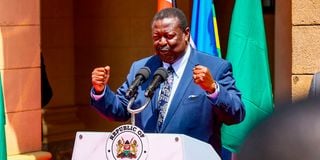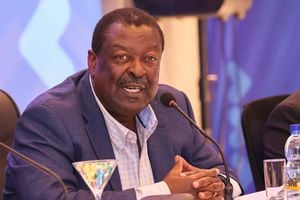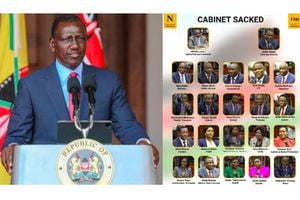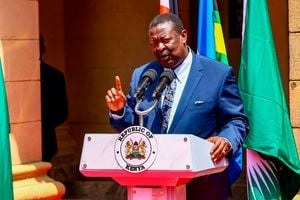
Prime Cabinet Secretary and CS for Foreign and Diaspora Affairs Musalia Mudavadi.
President William Ruto has formally appointed Cabinet Secretary Musalia Mudavadi to take charge of all ministries in an acting capacity until the Cabinet is reconstituted.
The decision - contained in a gazette notice dated July 11 - makes Mr Mudavadi, who also doubles as Cabinet Secretary for Foreign Affairs, a key cog in the running of a government that has been plunged into a major crisis by youths who have held the country hostage through mass nationwide protests.
Dr Ruto sacked his entire cabinet except Mr Mudavadi in an attempt to assuage a disgruntled public that had accused the team of corruption, incompetence and arrogance.
“That pursuant to Article 152 (5) (a) of the Constitution, Hon. Wycliffe Musalia Mudavadi, EGH, is assigned as the Acting Cabinet Secretary in all vacant ministerial portfolios,” states the notice signed by President Ruto.
When he dissolved his 22-member Cabinet on July 11, President Ruto said that some of the functions performed by the CSs would be executed by Principal Secretaries.
It has, however, emerged that certain functions can only be executed by the Cabinet secretaries and not PSs. Article 152 of the constitution establishes the Cabinet.
The Article goes on to state the composition of the Cabinet that includes the President, the Deputy President, the Attorney-General and not fewer than 14 and not more than 22 Cabinet Secretaries.
The Cabinet is the highest government decision maker including approving Bills and policies for transmittal to parliament for enactment, meaning that in the absence of the CSs, the PSs cannot sit to make such decisions.
The fact that the composition of the Cabinet is clearly defined by the constitution, means that the President, his deputy and Prime Cabinet Secretary do not constitute the Cabinet.
It is the reason why in transitions especially after a general election, the CSs in the previous regime will continue discharging government duties until they have been succeeded by CSs in the incoming government.
Function normally
This is to ensure that the government continues to function normally without any vacuum.
With the cabinet dissolved, it means that no gazette issuances on government decisions- appointment of CEOs, board chairmen and members of state corporations can be made.
There will also be no appointment of task forces for a national course on matters touching on the mandate of a CS. The constitution of a new cabinet will not be a walk in the park.
It takes time to have the nominees vetted and approved by the National Assembly before they can be appointed by the president by way of a gazette notice.
Amid the appointment process, one could go to court to challenge the composition or integrity issues, which could take time and therefore impact the government’s delivery.
Article 153 of the constitution stipulates the decisions, responsibility and accountability of the Cabinet.
It also provides that a decision by the Cabinet shall be in writing.
Cabinet secretaries are accountable individually, and collectively, to the President for the exercise of their powers and the performance of their functions, a function that cannot be delegated to PSs.
A CS is also required to appear before a committee of Parliament- the National Assembly or the Senate, when required by the committee and answer any question concerning a matter for which the CS is responsible.
Their absence means that a PS cannot represent them before committees of Parliament because there are specific matters a CS is responsible for before a committee of Parliament.
The constitution also provides that CSs shall act in accordance with “this constitution and provide Parliament with full and regular reports concerning matters under their control.”
Politically, the retention of Mr Mudavadi as the lone survivor in President Ruto’s Cabinet appears to signal the growing political importance of the former ANC party leader in the Kenya Kwanza fold.
With the political relationship between the President and his deputy Rigathi Gachagua shaky, the development has fuelled talks of the Foreign and Diaspora Affairs minister being his trump card in his re-election bid.
While some political party leaders were reluctant to relinquish their party leadership posts after appointment to various State positions, Mr Mudavadi left his position as ANC party boss to devote his time to serving the President, earning political mileage in the process.
Further, it is only ANC which has been keen on folding up to join President Ruto’s UDA party, in a merger that is aimed at forming a giant party to drive the latter’s re-election bid.
Political commentator Mark Bichachi said that the move by President Ruto is a major political statement and a sure sign that Mr Mudavadi is a possible running mate to the President should his relationship with DP Gachagua become untenable.
He explained that the Head of State could not send Mr Mudavadi packing because he is one of Kenya Kwanza co-principals and is in the position he currently holds not just by being appointed by the President but because of the coalition agreement signed in the run-up to the 2022 elections.
Mr Bichachi added that with Mt Kenya seeming to be moving towards the opposition while Western Kenya is among some of the places where the President is still enjoying political support, the stakes could not be higher for President Ruto.
“Politically speaking, Mudavadi is the Prime Cabinet secretary not by the virtue of being appointed by the President only but by virtue of the agreement he has with the President. The move not to fire him signals the fact that he is most likely Ruto’s running mate in 2027,” said Mr Bichachi.
Although President Ruto inherited the Mt Kenya and Rift Valley bastions that were crucial to their victory with President Kenyatta in 2013 and 2017, it is eating into his rival’s strongholds in Nyanza, Western and Coast that tilted the scale.
He beat Azimio leader Raila Odinga by a paltry 200,000 votes and it is the inroads he made in Mr Odinga’s previous strongholds of Coast and Western that cemented his victory.
In Western, Dr Ruto garnered 629,552 votes, close to three times the 242,000 votes UhuRuto had in 2017. The President beat Mr Odinga in Ford Kenya leader Moses Wetang’ula’s, another Kenya Kwanza co-principal, Bungoma County, polling 255,907 against the Azimio boss’s 145,240.
Upward political trajectory
Since joining Kenya Kwanza Alliance after ditching One Kenya Alliance late in 2022, the star of the ex-vice president has continued to blossom, maintaining an upward political trajectory.
In October last year, President Ruto handed Mr Mudavadi the powerful Foreign and Diaspora Affairs docket, an influential docket that guarantees him a position in the National Security Council.
The National Security Council is the President’s principal forum for national security and foreign policy decision-making.
The council brings together the President, the DP, the CS for Defence, Foreign Affairs and Internal Security, among others.
As the most experienced member of President Ruto’s Executive, the PCS was given additional responsibilities by the President as a way of trying to live up to his 30 percent promise of government share to Western during last year’s campaigns.
The PCS has been driving Kenya Kwanza’s foreign policy representing the President in several international assignments.
Mr Mudavadi has taken a keen interest in President Ruto’s bid to have his former political nemesis, Mr Raila Odinga, capture the chairmanship of the African Union Commission, and has been the face of his campaigns to win the top regional post.
He has also been dispatched by President Ruto to represent him in key events including the swearing-in of elected presidents as well as attending trade and investment forums.
At some point, DP Gachagua had to come out to clarify that he left the role to Mr Mudavadi in order to remain in the country to focus on the development agenda of their government and can only make foreign trips if they are about resource mobilisation.
“I have heard people saying that Musalia is doing my job. That he is the one going to Nigeria while I have been handed the ordinary jobs of fighting alcohol and drug abuse,” said the DP.
“I told the President to leave me here in Kenya to fight alcoholism and drug abuse. Let me tell you, the only foreign trip I will attend is one which will bring development…” he added.
Clean image
Professor Macharia Munene, History and International Relations professor at the United States International University in Nairobi, says that retaining Mr Mudavadi could be two-fold.
The first reason appears to be a sign that he could be a potential contender for a higher office come 2027 while on the other hand, being a foreign affairs minister, stability and a clean image had to be sent to foreign countries that the holder of the position is neither corrupt nor incompetent.
“There is nothing the President could have done with Mr Gachagua because he is not appointed but retaining Mudavadi can be seen as trying to keep peace with other regions as well as signalling that he is a potential contender for a higher office,” said Prof Munene.
He argued that President Ruto could not dismiss Mr Mudavadi because of the Cabinet position he holds as it would have sent the wrong signal to foreign countries.
“The President was firing his ministers either because of corruption allegations or incompetence. Having Mudavadi there would have given a wrong impression to foreign countries he has been dealing with as Kenya’s representative,” he said.
Dagoretti North MP Beatrice Elachi agrees with Prof Munene’s sentiments, saying sparing Mr Mudavadi was to ensure stability and continuity.
“You cannot sack a foreign minister without a replacement. With no idea when a new cabinet will be in place, the President could not send him away. He can stand in for the Head of State in many functions,” said Ms Elachi.
But in a recent interview with the Nation, the former deputy premier was cagey on whether he is keen on being Dr Ruto’s running mate in 2027.
He said it is far too early to discuss strategies for elections that are more than three years away as he is focused on supporting the President’s agenda through greater coordination of government programmes to improve service delivery to the people.
“There is simply too much on my plate to be fantasizing about hypothetical roles in the future,” Mr Mudavadi said.
“Speculating about future elections is a distraction from the critical work we must do today. The time for such discussions will come much later and when it does, Kenyans will have the chance to choose their leaders based on performance and their vision for the future,” he added.
Report by Moses Nyamori, David Mwere and Collins Omulo









